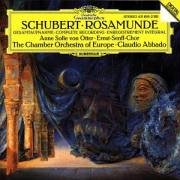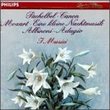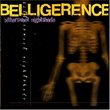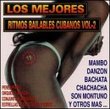| All Artists: Franz Schubert, Claudio Abbado, Anne Sofie von Otter, Ernst-Senff-Chor, The Chamber Orchestra of Europe Title: Schubert: Rosamunde / von Otter, Abbado, The Chamber Orchestra of Europe Members Wishing: 0 Total Copies: 0 Label: Deutsche Grammophon Release Date: 6/14/1991 Genre: Classical Style: Opera & Classical Vocal Number of Discs: 1 SwapaCD Credits: 1 UPC: 028943165525 |
Search - Franz Schubert, Claudio Abbado, Anne Sofie von Otter :: Schubert: Rosamunde / von Otter, Abbado, The Chamber Orchestra of Europe
 | Franz Schubert, Claudio Abbado, Anne Sofie von Otter Schubert: Rosamunde / von Otter, Abbado, The Chamber Orchestra of Europe Genre: Classical
|
Larger Image |
CD DetailsSimilar CDs |
CD ReviewsSeldom heard musical treasures Craig Matteson | Ann Arbor, MI | 07/07/2002 (5 out of 5 stars) "Rasmunde was a play with incidental singing and ballet mixed in. The play is lost, but we have this wonderful music. In its time the play was panned and the music praised. So, when you hear that this is the complete Rosamunde, I guess you can say we have the complete worthwhile parts. But you won't get any kind of story from what is here without reading the notes. In fact, the order of the pieces is altered for listening purposes. However, you could program your CD player to give it to you in dramatic sequence if that interests you.The performance provided here is especially good and tracks 7 & 8 are my favorites on the disk. All the music is very good Schubert which is better than all but the very greatest music. Yes, Schubert is one of my favorite composers, but I am willing to point out his faults. However, when you consider his output and that he died at 31 years old, what we have from him is completely awe inspiring. Rosamunde is one of the treasures he left us and I am grateful for this recording." A wonderful CD jhorro | VA | 07/12/2001 (5 out of 5 stars) "This is one of the few virtually complete recordings of Rosamunde available and what a delight it is. Abbado has just the right touch in all the numbers and the singers are excellent. Von Otter brings warmth and grace to her number and the chorus sings positively throughout. The orchestra gives sparkle to the lighter moments and a hushed, meditative quality to the slower numbers. The recording is a success for DG, well-balanced with the orchestra and chorus not recessed. Let us hope that Abbado has at least several more years to contribute great recordings to music lovers around the world." A Great But (Until Recent Decades) Neglected Work Erik North | San Gabriel, CA USA | 04/08/2005 (5 out of 5 stars) "Franz Schubert is considered one of the greatest composers who ever lived, next to Haydn, Mozart, and Beethoven. But until recent decades, much of his orchestral output has tended to be overshadowed by the immense number of songs he composed during his short lifespan (he passed away only three months short of his 32nd birthday). One of his greates works in the orchestral arena was the incidental music he composed for Helmina von Chezy's melodramatic play "Rosamunde, Princess Of Cyprus" in 1823. The play itself was a disaster, closing after only two performances; and had it not been for two enterprising English scholars named Sir George Grove and Sir Arthur Sullivan, Schubert's score might well have been lost.
Fortunately, because of their efforts, the music has survived; and it receives perhaps its greatest complete recording here with Claudio Abbado conducting the Chamber Orchestra of Europe. Beginning with the imposing "Magic Harp Overture" (intended for an earlier play), Schubert's "Rosamunde" score is comprised of two ballet sections, three entr'actes, three choruses, a short pastoral passage for winds, and a Romanze for mezzo-soprano ("Der Vollmond Strahlt"). Anne Sofie von Otter is excellent in her rendition of the latter; the Ernst Senff Choir is equally good in the choruses; and Abbado and the C.O.E. make the music sing and shine the way Schubert would have wanted it. It is by far one of the best recordings of theatrically-related classical music around (next to Mendelssohn's score for Shakespeare's "A Midsummer Night's Dream"), and is vigorously recommended." |

 Track Listings (11) - Disc #1
Track Listings (11) - Disc #1


